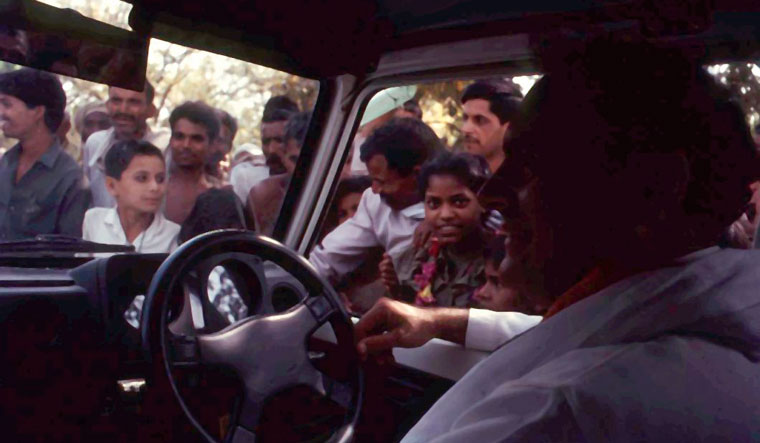An incident from 1975 is particularly revealing of the person that Rajiv Gandhi was. Prince Charles was visiting, and Rajiv’s mother, prime minister Indira Gandhi, was hosting a lunch in honour of the royal. Rajiv noticed that a painting in the lunch area was askew. Instead of calling the maintenance guys, he immediately brought out his toolbox, fixed the painting and sprayed his aftershave in the room to mask the smell of the quick DIY.
Like Agatha Christie’s finicky detective Hercule Poirot, Rajiv was a stickler for neatness. He would like everything to be in its place and in the right order. If it was not, he would straighten things up himself, often with the help of his well-equipped and meticulously arranged toolbox.
Rajiv credited his father, Feroze Gandhi, for his interest in all things mechanical. Feroze would insist on repairing any malfunctioning gadget in the house himself, and he got Rajiv and younger son, Sanjay, involved in it. This, said Rajiv, taught him the dignity of labour.
Despite his interest in mechanics, Rajiv could not get a degree in engineering. He first went to Trinity College, Cambridge, and shifted to Imperial College, London, where he studied mechanical engineering, but could not complete the course. He later admitted that he was not interested in “mugging for exams”. His bookshelves, though, were filled with books on science and engineering; they had none on philosophy, politics or history. He remained apolitical for as long as he could.
As soon as he returned from England in 1965, Rajiv enrolled in the Delhi Flying Club. It was a childhood visit to a gliding club with grandfather Jawaharlal Nehru that had ignited his interest in flying. He went on to obtain a commercial pilot’s licence, and in 1970, joined the Indian Airlines as a pilot.
Also read
- A Kindred Spirit recalls Rajiv Gandhi memories
- Rajiv Gandhi: The caring and cordial democrat
- Rajiv Gandhi opened the doors for 1991 reforms: Montek Singh Ahluwalia
- How Rajiv Gandhi reset India’s relationship with the west: Ravni Thakur
- Politicians of my generation were inspired by Rajiv Gandhi: Bhupesh Baghel
- Rajiv knew a divided Sri Lanka would create problems for India: Mani Shankar Aiyar
- Political naivety overshadowed much of Rajiv Gandhi’s positive work: Rasheed Kidwai
Rajiv was perhaps the only prime minister who drove himself to work. And he was fond of driving really fast. Actress Simi Garewal, who produced a documentary on him, wrote about shooting him behind the wheel. “I was holding the portable light and sitting next to him at the wheel,” she said. “The roads were cleared of traffic and Rajiv ji drove really fast! He would careen and swerve on those Delhi roundabouts and my poor cameraman would be rolling from side to side on the floor of the backseat. On hearing the clatter-bangs behind him, Rajiv ji kept asking politely, ‘Are you alright?’ All we could hear were feeble grunts and groans!”
He was a keen photographer, but did not think much about the photographs he took. A publisher friend had pestered him in the 1980s to bring out a book of his photographs, but he kept saying no. He believed the photos belonged to his private world.
After his death, in 1994, Sonia brought out a book, Rajiv’s World: Photographs by Rajiv Gandhi, of photographs taken by Rajiv over four decades—from his childhood to his last year in office. His subjects were varied—nature, wildlife, architecture, pets and, most often, family.
“A fair amount of this photography was at home,” Sonia wrote. “While he took numerous photographs of his mother and brother, of his friends and our pets, his most frequent subjects were Rahul, Priyanka and myself. I was always averse to being photographed—as many people are—but with Rajiv, it was different: I had no reservations and felt completely at ease.”
At a time when the world was split between the Rolling Stones and the Beatles, Rajiv preferred the former. He liked both Indian and western classical music. Indira had once said that Rajiv had got her interested in Bach. He was also a fan of the jazz greats Stan Getz, John Coltrane and Wynton Marsalis.
The many interests of Rajiv also included amateur radio. ‘VU2RG’ was his call sign. He kept in touch with friends all over the world over amateur radio.
With a rich and varied apolitical aspect to his personality, Rajiv led a contented life as a private citizen. Essentially a family man, he had no interest in public life. Life, however, had other plans.


